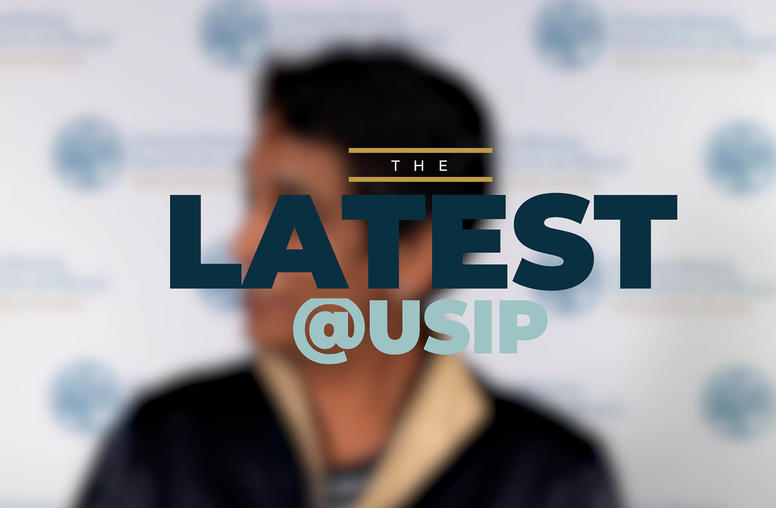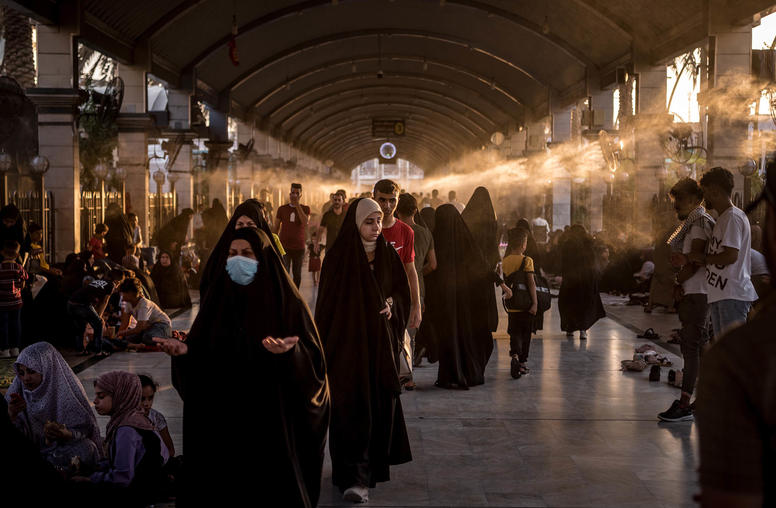The Coronavirus Requires Global Cooperation—Now
The pandemic threatens massive losses in fragile and war-torn states. International institutions must act boldly.
As the world’s privileged cope with the COVID pandemic through telework and sheltering at home, millions of people face grim struggles for survival, packed into informal settlements or camps for people already displaced in war-torn or fragile states. Governments have missed opportunities for a stronger international response, partly because of great-power rivalries. The economically powerful Group of 20 nations and international financial institutions have made a start at buoying the world’s economy—but other multilateral forums are mired in stasis. The U.N. Security Council should act to get ahead of the pandemic in fragile states and seize the moment to advance peace in some of the world’s most intractable conflicts.

The COVID-19 virus has only begun to strike the dozens of “fragile” states—those whose poor governance and weak social contracts disable them from resolving internal conflicts peacefully. The widespread lack of testing may be underreporting COVID’s spread in such countries, measured on March 27 at just over 32,000 cases. “Social distancing” is nearly impossible for many communities, such as the million ethnic Rohingya refugees packed into camps in Bangladesh with population densities up to six times that of New York City. In many other fragile contexts, people scraping by below the poverty line face the grim choice of complying with government quarantine orders, or going hungry. As with climate change and any other catastrophe, the world’s poor, and those displaced by warfare, will suffer and die in vastly greater proportions.
Recognizing the potential for the pandemic to worsen already dire humanitarian emergencies, the United Nations has appealed for $2 billion to fight the virus and address economic disruptions. The International Committee of the Red Cross appealed for more than $800 million. The World Bank and the International Monetary Fund announced $14 billion to help countries fight the pandemic and address economic disruptions, and urged bilateral creditors to suspend debt payments from the world’s poorest countries, among other steps. U.N. Secretary General António Guterres’ call for a global cease-fire to fight the virus has already led to a much-needed truce in Yemen.
Still, the lack of action by the Security Council and other major multilateral forums is increasingly visible—and concerning. Great power rivalries certainly help explain the stasis. China’s U.N. representative, upon assuming the agenda-setting presidency of the Security Council in early March, referred to the coronavirus as an issue “under the umbrella of global public health and security” and thus outside the scope of the Council’s geopolitical remit. That reflects China’s strategy to limit the scope of Security Council deliberations to issues that represent little threat to Beijing’s domestic practices. At the same time, China has been positioning itself as a vital source of aid to contain the virus, offering help to countries in Europe, Asia and Africa. Last week, an effort by the Group of Seven nations to advance a coordinated international response to the pandemic faltered over the U.S. insistence upon replacing the World Health Organization’s official designation for the disease, “COVID-19,” with the name “Wuhan virus.” Disagreements over the name of the virus reportedly also have stymied efforts to negotiate a U.N. Security Council resolution.
The Precedent: Ebola
There is precedent for stronger multilateral political action in the face of a dangerous epidemic. In 2014, the Security Council adopted an unprecedented resolution to confront the largest-ever outbreak of the Ebola virus, in West Africa. The Council pressed governments to provide material help to the most affected countries and to ease trade and travel restrictions that were undermining the public health response. This effort reinforced the agencies and health workers on the frontlines of the response and enhanced international coordination to contain the outbreak.
Despite the apparent lack of international comity, the world’s premier multilateral bodies urgently must broaden and follow-through on the G20 commitments in hopes of getting ahead of the crisis in fragile and conflict-affected states. International leaders could focus attention and resources on the most vulnerable populations and accelerate the World Health Organization’s efforts to steer assistance to countries with weak public health systems and a high propensity for rapid spread. They also could provide an important platform for sharing best practices in virus containment and response, while coordinating measures to protect critical medical supply chains and economic networks.
U.N. Security Council’s Vital Role
The Security Council is the world’s primary mechanism for addressing threats to peace and security, with its resolutions carrying the force of international law. It is thus uniquely positioned to steer and augment the international response to COVID-19, as it did against Ebola in 2014. It also can seize the momentum from COVID-19 related cease-fires to advance peace processes in Yemen and elsewhere. Among other steps, the Council could:
- Apply pressure for cease-fires in violent conflicts to facilitate COVID-19 treatment and prevention.
- Urge member states to coordinate and steer the production and delivery of critical medical matériel, such as testing kits and protective gear, to fragile states and countries with weak health systems.
- Call for states to prioritize the provision of screening and testing capabilities in critically vulnerable locations, such as large settlements of displaced populations.
- Urge affected states to rapidly expand public health messaging campaigns targeting critically vulnerable areas.
- Call for unrestricted access for frontline humanitarian workers and health professionals, especially in conflict zones and contested areas.
- Urge states to redouble support to the WHO and the U.N. humanitarian response plan.
- Promote testing and surveillance measures to limit the spread of the virus within U.N. peacekeeping missions, and among the populations where missions are deployed.
- Signal consequences for states that use violence to contain the virus, or as a pretense to restrict civil liberties, undermine human rights protections or threaten political opposition groups.
Most importantly, action from key multilateral bodies will reinforce the necessity of international cooperation to address a generational threat to global peace and security that respects no border, the worst of which we may not have witnessed yet. With millions of the world’s most vulnerable people facing the pandemic, the time for concerted international action is now.




